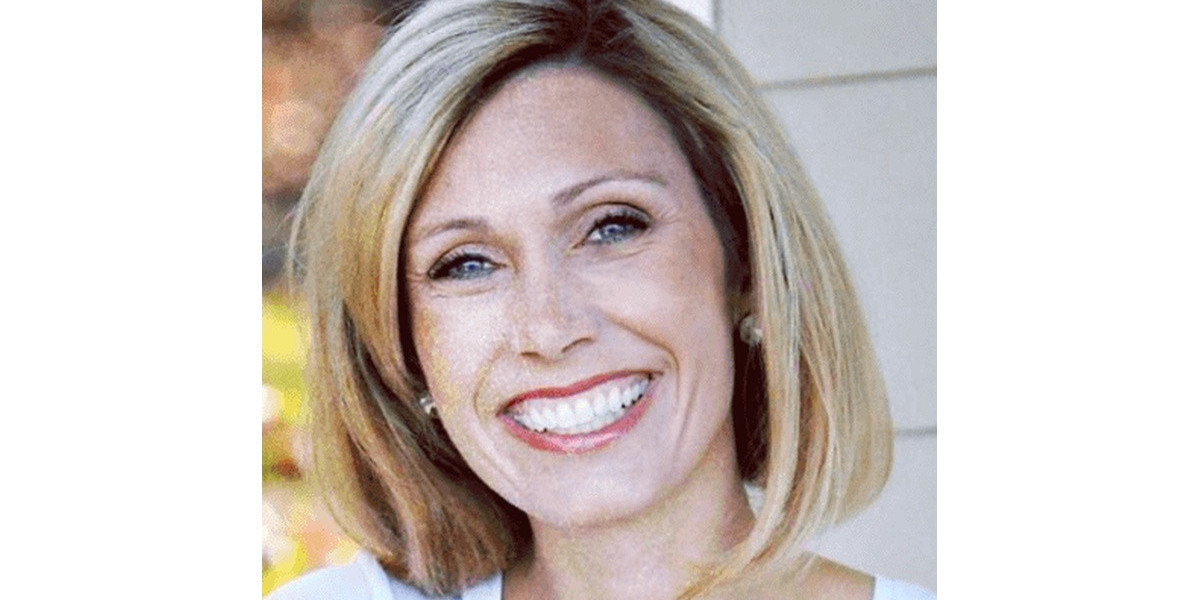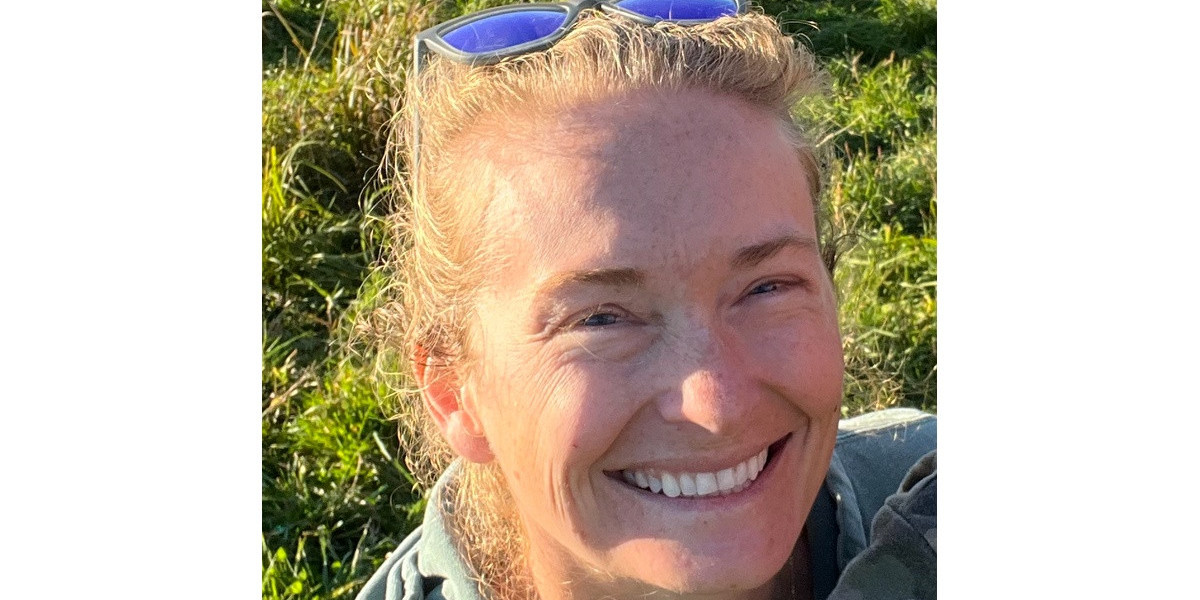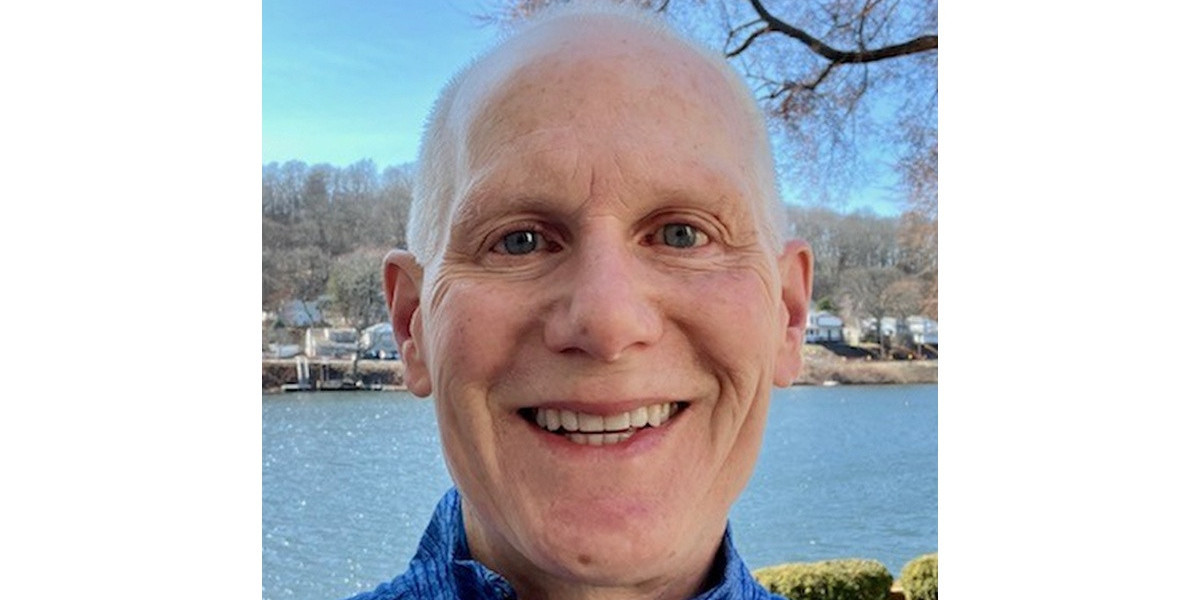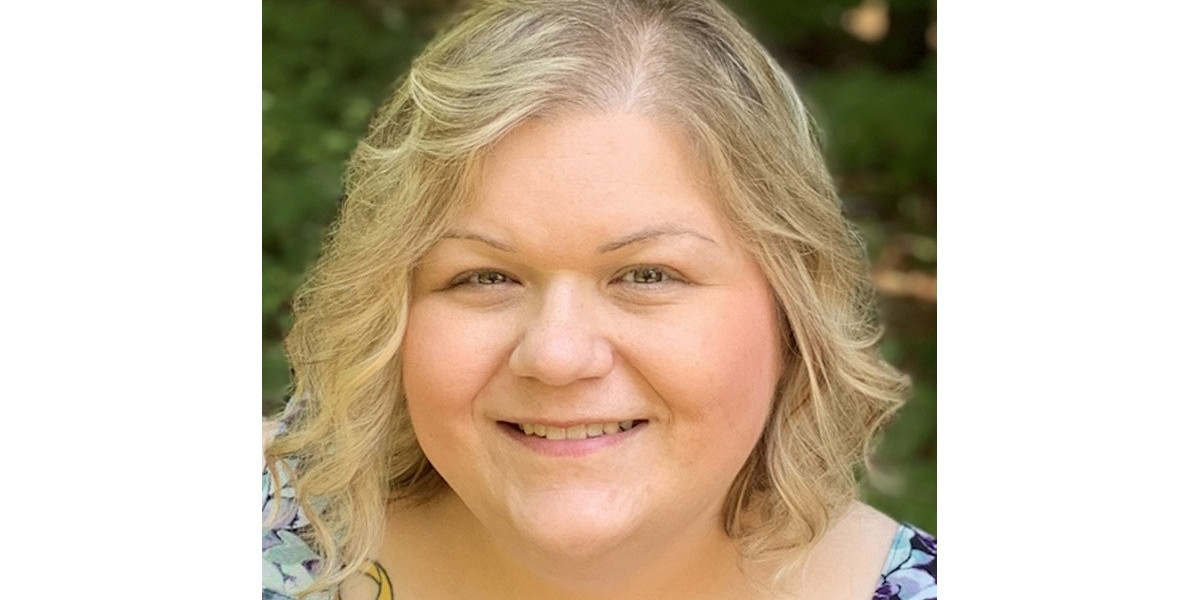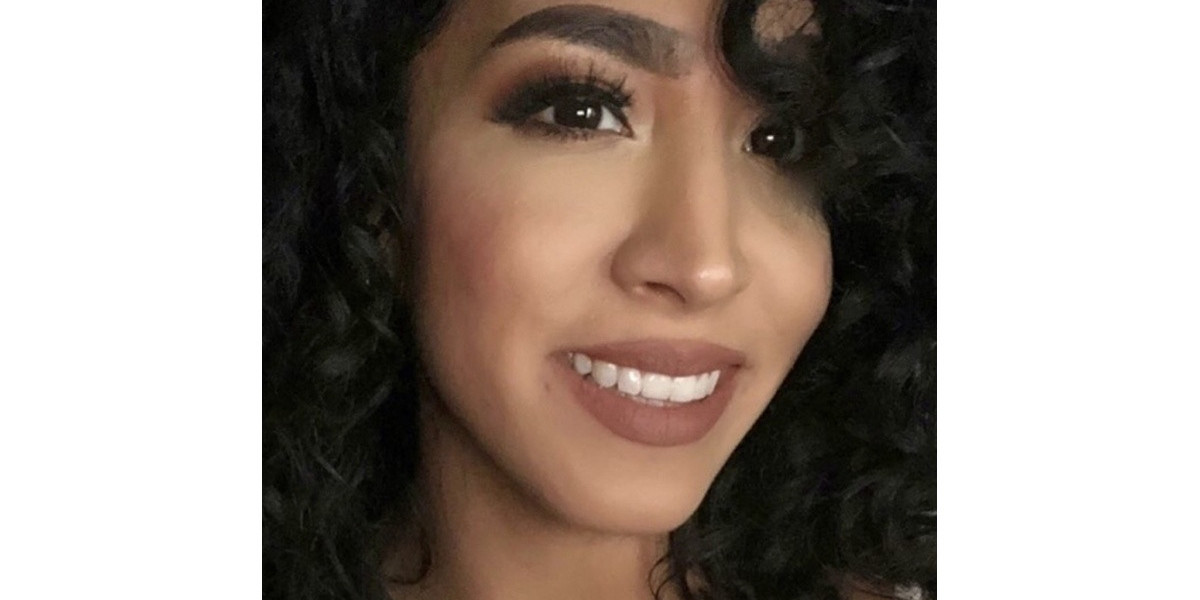Randalynn’s Stage 1C High-Grade Serous Carcinoma Ovarian Cancer Story
Randalynn V., High-Grade Serous Carcinoma, Stage 1C
Symptoms: Pulling sensation when emptying bladder; abdominal pain
Treatments: Chemotherapy (carboplatin & paclitaxel), surgery
Randalynn’s Stage 1C High-Grade Serous Carcinoma Ovarian Cancer Story
In her story, she shares how it was undergoing treatment, both surgery and chemotherapy, tips on dealing with the hair loss, and how she advocated for herself as a patient. Thank you for sharing your story, Randalynn!
Randalynn has turned her cancer experience into a life of advocacy after getting diagnosed with stage 1C high-grade serous ovarian cancer.
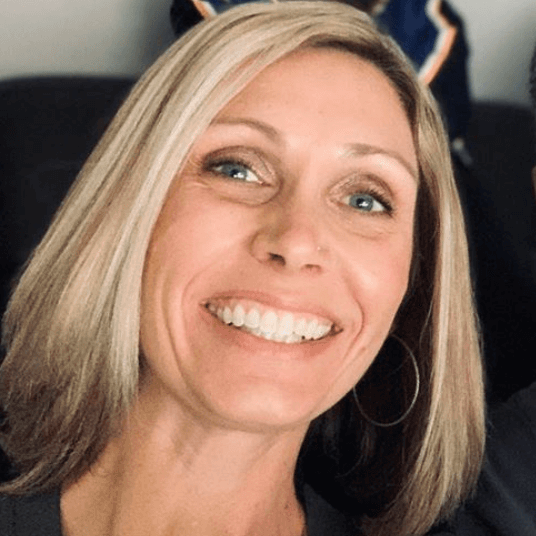
- Name: Randalynn V.
- Diagnosis:
- Ovarian cancer
- High-grade serous
- Age at DX: 55
- Staging: 1C
- 1st Symptoms:
- Fatigue
- Weight loss
- Feeling of UTI
- Treatment:
- Surgery to remove mass (before it was determined to be cancerous)
- Hysterectomy, including cervix
- Chemotherapy
- Paclitaxel (Taxol) & carboplatin
- 6 rounds
- One infusion every three weeks
- Paclitaxel (Taxol) & carboplatin
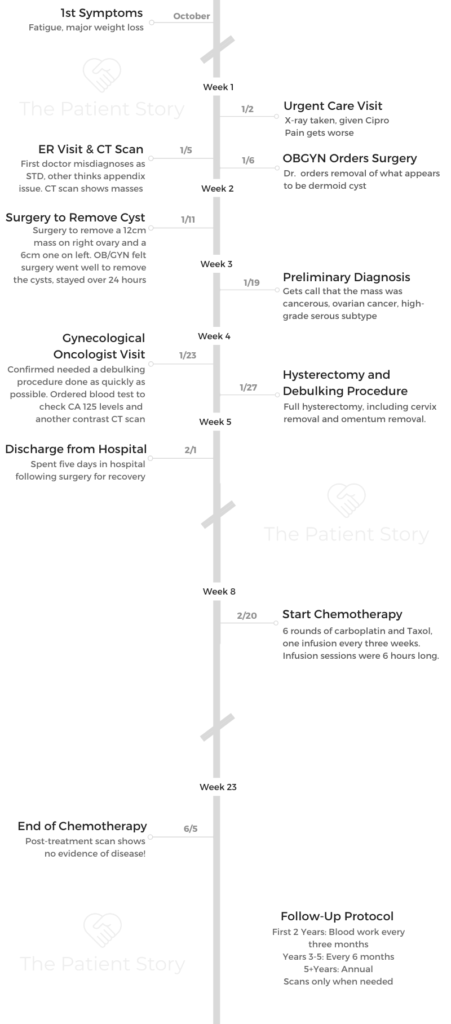
It is going to feel like you are going through the worst possible thing ever, but if you can put one foot in front of the other, you will get to that finish line, whatever it is. Then you take the next steps.
You take each step at a time, and once you get a plan in place, things start to seem a whole lot easier because you figure out what to do. You focus on that.
Randalynn V.
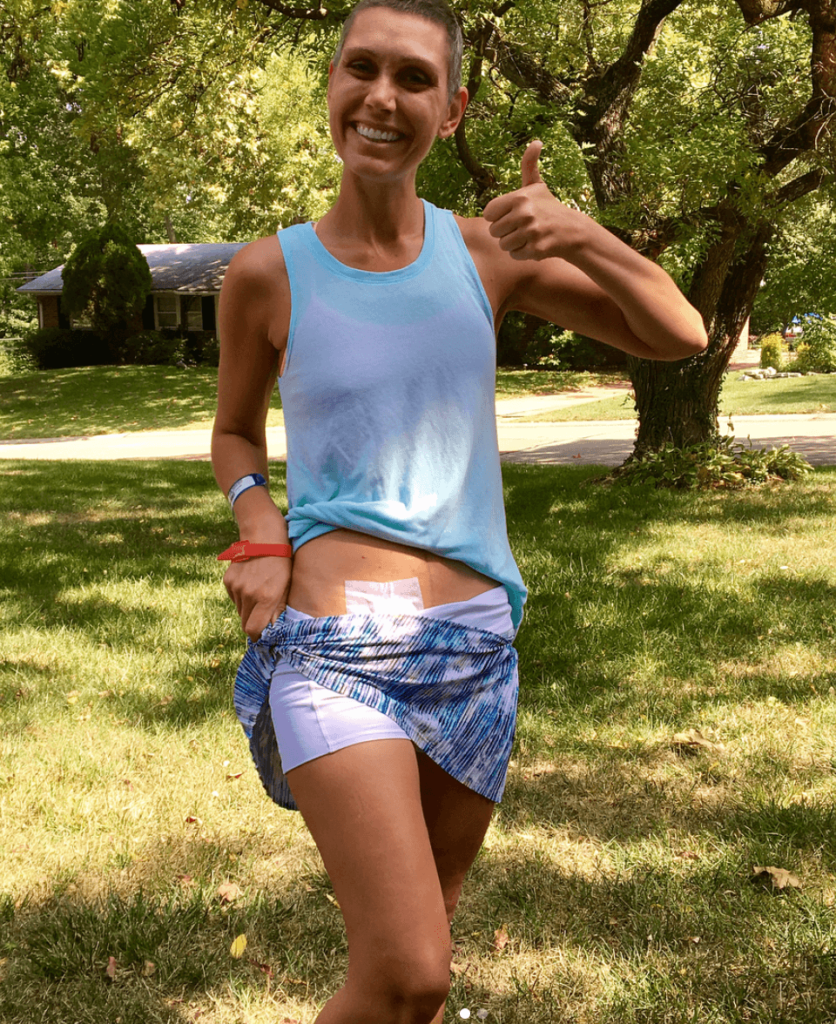
- First Symptoms and Tests
- What were the first symptoms?
- Describe the visits to urgent care and the ER
- Dealing with doctors who won’t listen to the patient
- Describe the moment you learned about the masses
- What were the next steps when you got admitted to the hospital?
- The staff missed performing a key test
- How did they describe the mass?
- How did the initial surgery go?
- How was recovery from the surgery?
- Cancer Diagnosis
- How long did it take to hear the official cancer diagnosis?
- How were you able to process the diagnosis?
- How did you break the news to your kids?
- Deciding to inform the kids' schools about the cancer
- Any guidance for other parents on dealing with cancer around young children?
- How did you share the news of your cancer diagnosis with people outside of your mom?
- Treatment Decisions
- How did you decide where to go for cancer treatment?
- How quickly were you able to get an appointment?
- Describe the first appointment with the gynecological oncologist
- Advocating for yourself as a patient
- The importance of your doctor's bedside manners
- How was it having your parents come into the appointment?
- How did you decide what kind of surgery to pursue (laparoscopic or robotic)?
- Surgery and Recovery
- Chemotherapy (Carboplatin and Taxol)
- Hair Loss
- End of Treatment
- Reflections
This interview has been edited for clarity. This is not medical advice. Please consult with your healthcare provider for treatment decisions.
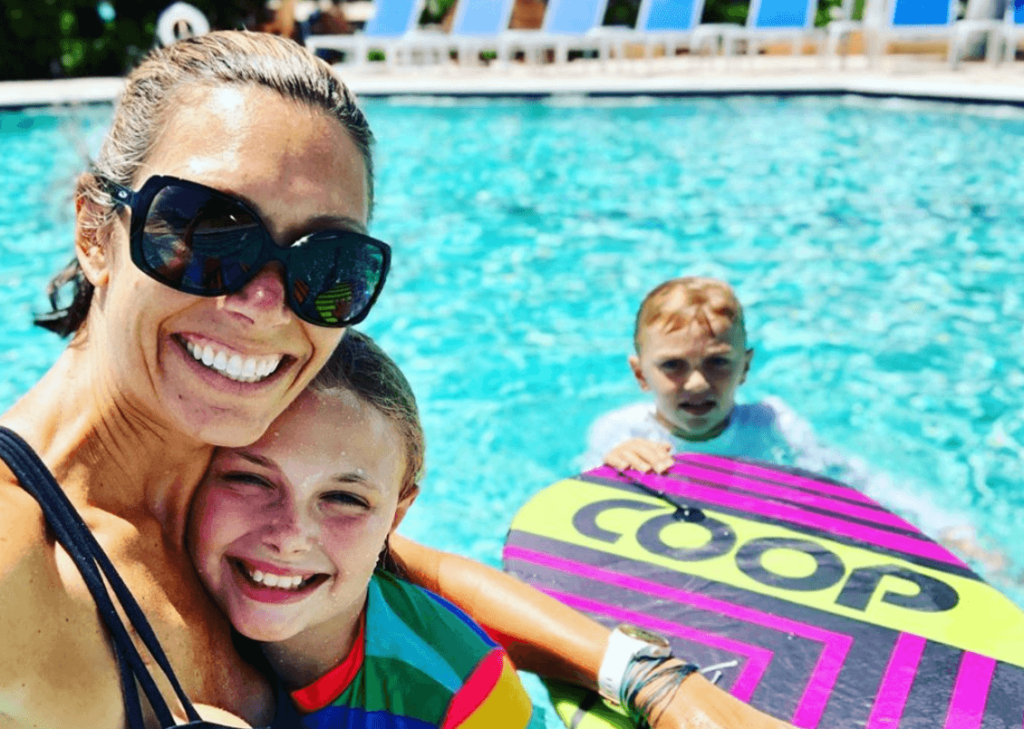
First Symptoms and Tests
What were the first symptoms?
I was 36 years old. had an extremely stressful job. I am a part-time single mom of two children. Couple that with working 50-plus hours a week [and] having some events at the office go on. I was exhausted and fatigued. When I’m stressed out, I don’t eat. All of those things were norms for me.
That totally took over October. When I look back in photos, the weight loss was significant, like, “There’s something wrong with her.” You can start seeing that in July.
I have my children on Christmas Day, then they’ll go to one parent’s house from mid-day Christmas until New Year’s Day. It was my year to do the transition mid-day, and I decided to go on a trip.
I told one girlfriend that I was so tired that my workout routine must be stale. That’s what it is; it can’t be anything else going on. I just need to decompress. So I started doing a completely different workout.
In doing so, the doctors think what ended up happening was the tendons had wrapped themselves around the tumor, which was the size of a cantaloupe, and I only weighed 115 pounds. You couldn’t see it, which was the really weird thing.
The tendons started rubbing differently. I thought I was developing a UTI and called my nurse practitioner to ask for a prescription.
At that time, it was still fine. I don’t get them frequently, but I thought it was normal. I’d had them before, so maybe this was just caused from all the stress and everything else.
Describe the visits to urgent care and the ER
January 2nd was when I went to urgent care. They did an X-ray. Cysts like this don’t show up on X-rays, and they just wanted to make sure nothing else was going on.
I don’t know what they thought may have shown up on the X-ray, but they switched me to Cipro, which is supposed to knock everything out within 24 hours.
Then 24 hours later, it still hadn’t worked. It was probably me taking 10 or 20 steps and having to bend over because the pain was so significant. It felt like I was in labor. I was like, “This is just not normal.”
I went to the ER, and that was when — after me persuading that what they thought it was wasn’t what it was — we did a pelvic CT scan with contrast dye, and both masses showed up.
I had one on my left ovary and one on my right, but my right was the main culprit in what would come back as having ovarian cancer.
Dealing with doctors who won’t listen to the patient
I remember it was a male doctor who thought it was an STD when I first got to the ER. I remember pleading with him to believe me, and he didn’t.
A woman transported me from the ER to where the scan was taking place. I was in tears because of what he had said. She said, “He’s at the nurse’s station right now asking them if he overstepped and why you were in tears. They’re trying to explain to him, ‘You didn’t believe her. We don’t think she’s making this up, but you didn’t believe her.’”
The transporter herself said, “More times than that, I hear the ER doctors giving a diagnosis before they’ve run all the tests.”
They need to learn that whatever they’re assuming it is, they should not lay those things out until they know for a fact that that is what it is.
The female physician who was on call that night was the one who actually said, “I don’t think that’s what it is either. Her appendix is ready to rupture. Let’s go ahead and do a pelvic CT scan.”
It’s interesting how things play out and how physicians and the people around them interact, like, “You probably should have handled that a little differently.”
»MORE: How to be a self-advocate as a patient
Describe the moment you learned about the masses
[The doctor’s] face when she came in to tell me about the masses — it still didn’t click in my head. I was like, “Okay, well, people get ovarian cysts. I guess this explains it.”
I was supposed to go snow skiing with my kids in 10 days from then, and I was like, ‘Well, can we wait till after that?’
My mom was like, ‘You’re on morphine! It’s not working. No, we can’t wait.’
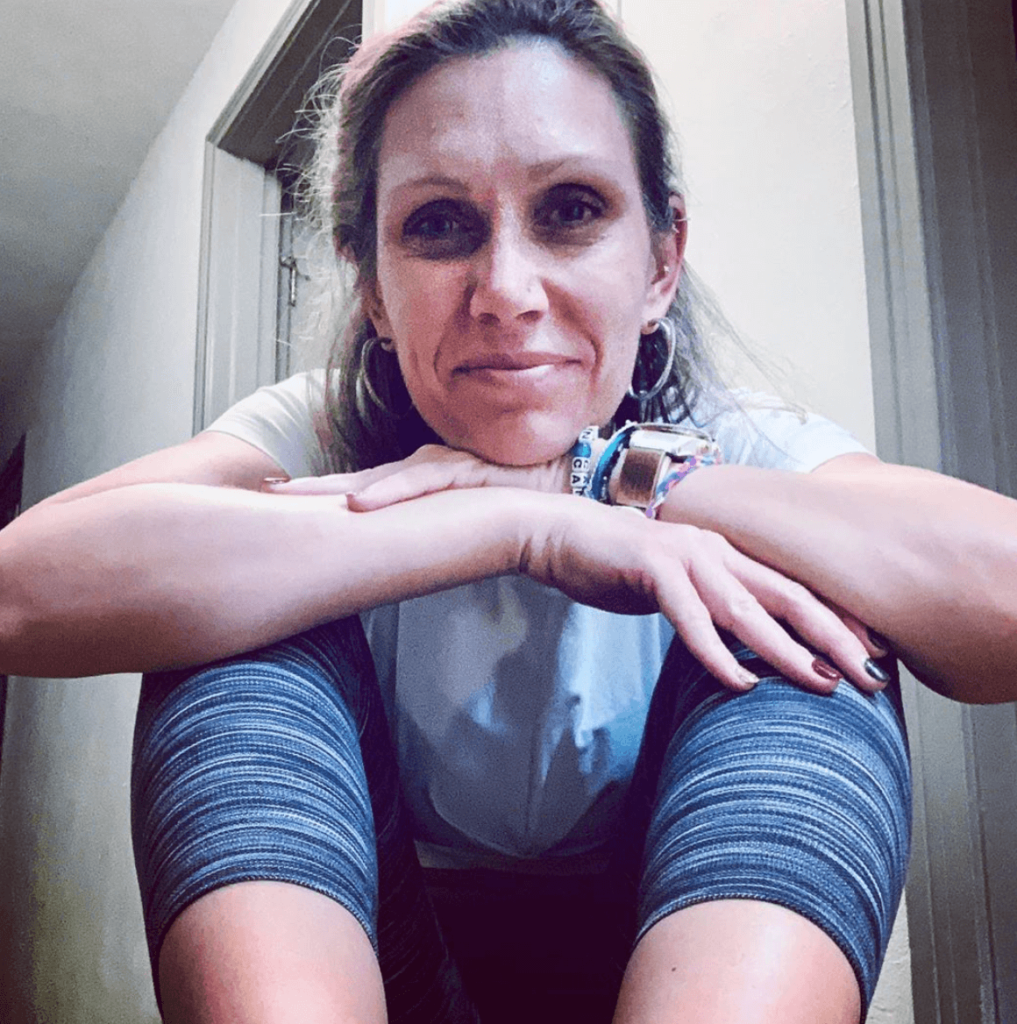
What were the next steps when you got admitted to the hospital?
The physician on call that night in the ER, it was about 1:30 a.m. when she came and told me, “We did the ultrasound as well. You have a mass on your right ovary.” She didn’t tell me I had two, nor how large they were. She asked, “Do you need to have an OB-GYN?”
I said, “Yes, I delivered in this hospital. She is on staff here, or at least has rights to be in the hospital in the OR (operating room) here.” They said, “Okay, we’ll give her a call, and we’ll see what she wants to do.”
They admitted me because the pain was [bad]. Morphine wasn’t managing it, and they ended up going to a Dilaudid drip. On top of that, they wanted to start a round of antibiotics.
My OB-GYN came in the next morning, and she said, “You look good. You look tired. How’s the pain?”
I said I was still in a ton of pain, and she said she thought there was a little bit of an infection and they’d keep me on the antibiotics. She said she was trying to get an OR, but she didn’t know how long it would be.
The staff missed performing a key test
I ended up staying over the weekend there. In the time I was there, I had my blood drawn at least twice a day.
Not one time did they ever draw a CA 125 test.
It’s not 100% foolproof, but for the type I had, it would have shown up as an elevated CA 125 level, which could have triggered in their minds, “Okay, we probably shouldn’t remove this. We should have her be with a gynecological oncologist to do the removal.”
How did they describe the mass?
What was explained to me was that I had a 12-centimeter, so the size of a cantaloupe, dermoid cyst. I’m not grossed out by them because I had cancer, but in the beginning I was like, “I’m not going to tell anybody that this is what I had.”
If you’re familiar with that, those are the kind that grows teeth and hair in this really kind of interesting way. It’s super lumpy.
That wouldn’t have triggered anything either. I ended up going home 24 hours before I had surgery, and my OB said, “So long as you stay in bed, let’s get you home so you can at least get some rest.”
I did and came back the next day, so it was about a four-day window between when I was admitted to the ER and when we actually had surgery.

How did the initial surgery go?
My OB-GYN wanted to try to do the surgery without having to do more than a C-section type of scar. They were able to get it out that way. In doing so, the surgery took quite a bit longer.
My tumor had been compromised. [If] it was compromised during surgery or whether it was compromised prior, we don’t know. She considered surgery to be a success.
I stayed over one night because they couldn’t get my blood pressure up and I was in a tremendous amount of pain, which was probably due to the fact that they had just removed a whole bunch of cancer, and there was other stuff going on.
She told me they’d have results in 24 hours and she didn’t expect for there to be any issues whatsoever.
How was recovery from the surgery?
I didn’t have any prep beforehand. It was supposed to take maybe 45 minutes but ended up closer to two hours because of the size and the way they were trying to get it out. They also had to remove the cyst on my left ovary.
They took my ovary, and it was attached to my fallopian tube on my right side. That was what was biopsied. Women who have C-sections, I have a lot more respect for you because it was pretty challenging afterwards.
I had never had an abdominal surgery before, so I hadn’t thought about the fact that even though it was lower, below the bikini line, having to try to move and get out of bed was challenging.
I was still tired because I had cancer, and I still really wasn’t able to eat because I had ovarian cancer, which is one of those symptoms, not feeling like you want to eat or feeling full quickly when you’ve taken a few bites.
»MORE: Read more patient experiences with surgery
Cancer Diagnosis
How long did it take to hear the official cancer diagnosis?
I left the hospital on a Friday, a holiday weekend. I hadn’t gotten the results by the end of Friday [and] knew I wouldn’t Monday because it was a holiday.
I had my OB-GYN’s cell phone number, so I texted her Tuesday and said, “Just checking in. Do you have those results? I just wanted to make sure everything was okay.”
She said she didn’t and that she would call the lab because it was weird she didn’t have them yet. Wednesday went by, and nothing. I thought I would give her till Thursday because I didn’t want to seem like that crazy patient who’s totally nagging. She had other things going on. She told me she didn’t think it was any big deal.
Thursday I had set in my mind that I was going to give her until 1:30 p.m. That allowed her through lunch, and then I would text message her again.
She beat me to the punch. Right around lunchtime on that Thursday, she called me. My mom was out. The call came in, and I was like, “Hey, how’s it going,” being my normal upbeat self. She said she was good and asked how I was feeling.
I said I was super tired and that it kind of hurt a lot. I should have recognized the tone in her voice, but I didn’t. She said she knew why my labs took longer to get back, and she wasn’t expecting this.
She said she had spent all morning thinking if she should call me to tell me to go into the office, but that I would know I was sick and would have to drive over, or to tell me over the phone.
She said she decided to tell me over the phone because she didn’t want me to have to get in the car, then have to drive out there, and drive back.
She said I had ovarian cancer, it’s high-grade, [and] that she’d have to get me to a gynecological oncologist very quickly.
How were you able to process the diagnosis?
I told her to give me a second, and I put the phone down. I had prepared myself. We were a week out.
I had actually talked to a friend who had had several cancer diagnoses. She said the further that you get out, the more chances it’s probably not good, especially when the lab is telling her they’re running more results.
In my head, I knew a dermoid cyst had a 1% chance of being ovarian cancer. Being my age, 36 at the time, I had 6.7% chance of being diagnosed with ovarian cancer. Put those things together and my odds were going to be very low of cancer happening, but I had still told myself at that point that it was very likely going to come back that way.
I remember I said I just needed a second, and I folded over in my bed, had a moment, sat up, took a deep breath, [and] said I was really sorry. She said no, she was really sorry.
I had two hours until my kids came home from school. In that two-hour time period, I had to find myself an oncologist [and] get an appointment. My mother was at my house at the time because I couldn’t take care of two kids by myself post-surgery.
She didn’t take the news so well when I told her, so I needed to get someone over to the house, one of her friends, to help her through this and to get her back up to normal speed before the kids came home as well.
I didn’t really have time to process it. The only time I had to really process it was at night. I didn’t sleep very much.
Honestly, once you find out you have cancer and you get into the flow of things, they have you going non-stop, one thing after another, and there’s really not time to think about it. I don’t think the whole processing you have cancer part happens — at least it didn’t for me — until treatment stopped.
That was when I had the time to process what the last six months looked like. I made it, but I didn’t even think about it one time more than what I was actually having to go through at the time.
»MORE: Processing a cancer diagnosis
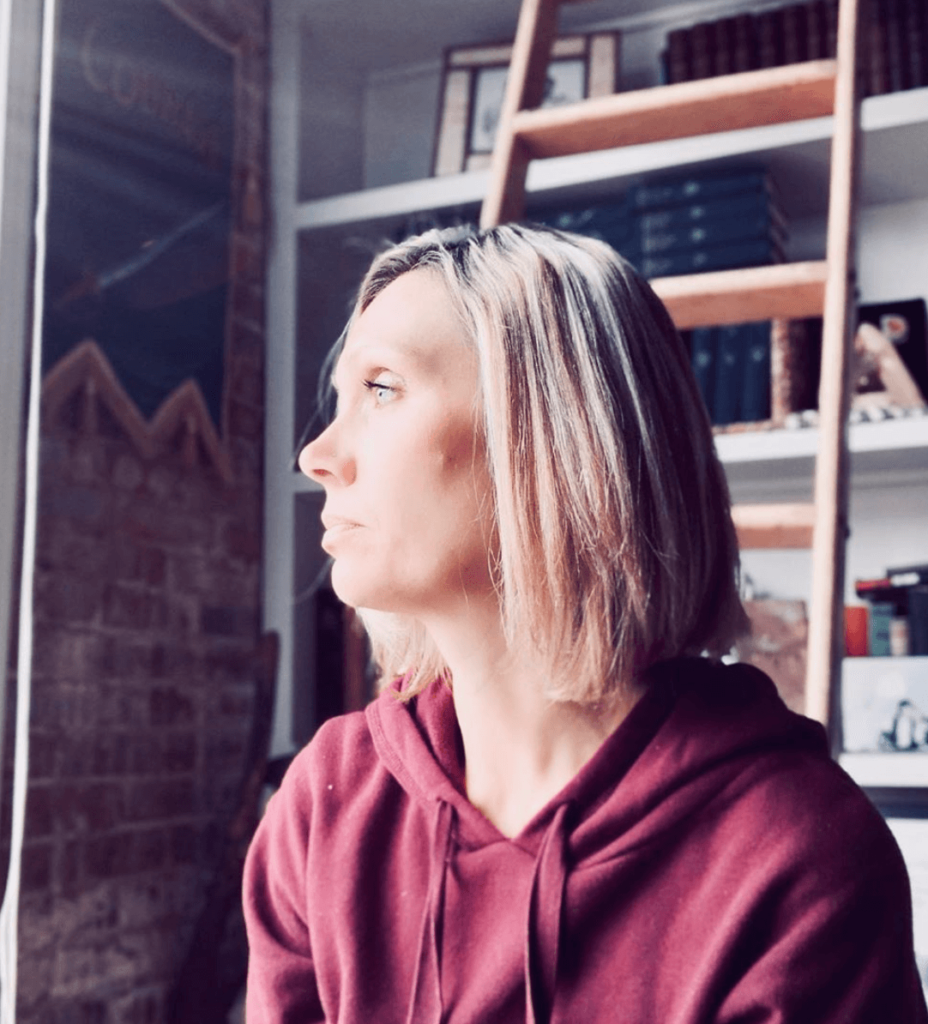
How did you break the news to your kids?
My son was three, and my daughter was seven. My daughter knows what cancer is. She knew my mom’s dad was, at the time, dying from it. My son was three.
‘Mommy’s sick.’ That’s all he could really grasp. He didn’t understand what it would really mean or anything.
I did not tell them. I went through my debulking procedure and found out what stage it was. I told my kids the weekend before I started chemo just because I was going to lose my hair. That was one of the things I wanted to find out as well.
I decided it was in my best interest to tell them, to be open and honest about it.
I have an ex-husband and wanted to do it together, so he came over. We told them together because I wanted to use the words I was using so that he knew what exactly was said and that if there were any concerns, we were able to both know what those would have been and talk through them.
»MORE: Parents describe how they handled cancer with their kids
Deciding to inform the kids’ schools about the cancer
One kid was in first grade; one was still in a pre-K program. The kids’ schools both did really well with it. They had gone through adjusting through the change when we went through the divorce, and now I was saying, “Have another change we’re adding to the mix: I have ovarian cancer.” We worked as a team and combatted the whole thing.
Any guidance for other parents on dealing with cancer around young children?
For the kids’ side of things, the director of the school where my son was had just had a neighbor go through breast cancer. Her children are around the same age. They used a book.
I did not use the book with them. What I did was read the book to see what it said. There are a lot of books out there you can get that walk through “Mommy’s sick or Daddy’s sick” and break it down in those terms.
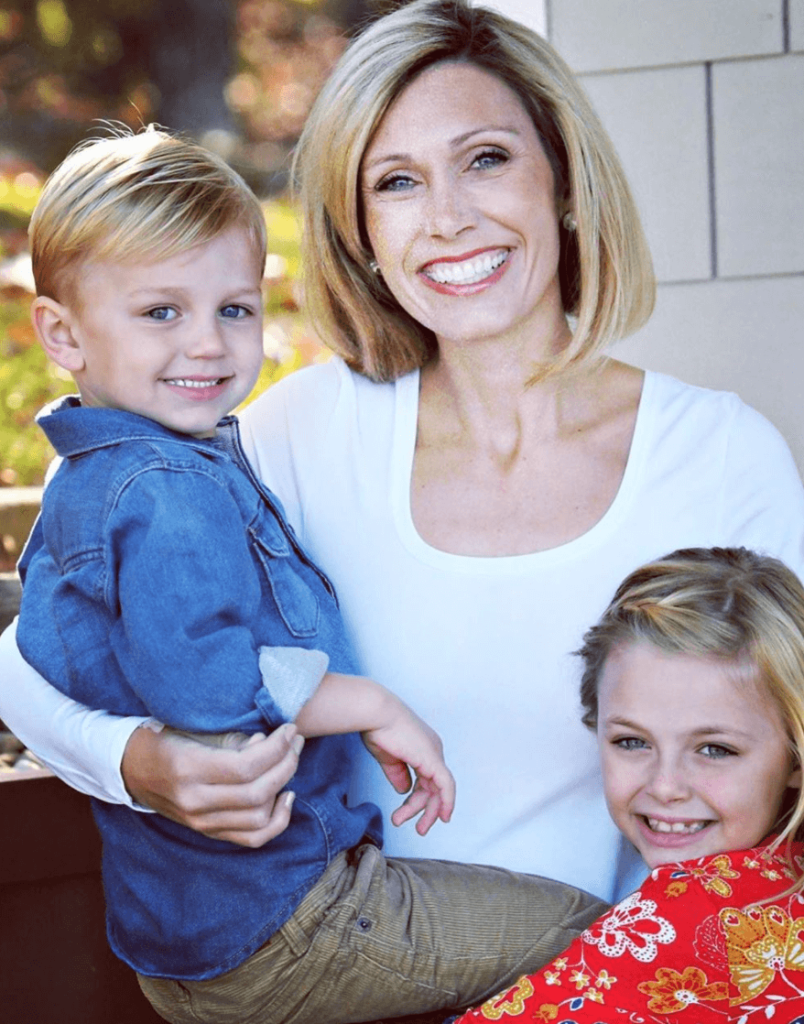
That initial part went okay. What I couldn’t prepare for was them actually see me go through everything. They got pretty tired of Mommy always being sick and not being able to be there.
My support system was great, so I got to everything, even if I thought I was going to be sick while I was there. I made sure that every child thing there was, I showed up for it. I think that’s really key, too, just so you can try to make things as normal as possible.
Everyone wanted to help. I said, “Let me get through a couple rounds and see what I’m dealing with. I don’t know what I’m going to feel like, and I don’t know where I need help.”
What I ended up coming up with was allowing for there to be meals, specifically for my mother and the children. I didn’t know if I was going to eat for the day and told them that. I didn’t want my mom to have to worry about feeding them and herself.
I told my supporters if they made sure my mom and kids had food, they wouldn’t have to worry about me. My mom would make sure I had food. That was super helpful.
How did you share the news of your cancer diagnosis with people outside of your mom?
I only told my inner circle and my family. I think my parents probably handled the whole telling my brother and all the grandparents. We were trying to hold off on telling my grandfather who wasn’t doing well; however, he was having chemo and labs at the same cancer center the day I had to go in to do my lab work and pre-op stuff, as well as CT scan.
My mom had gone to everything before that with him. What was she going to say? “Sorry, I can’t do this,” but then we run into each other in the lobby or something like that. That was the next day. So he was one of the first people I saw.
The rest I didn’t tell until I lost my hair. I needed to go through debulking surgery. I was in the hospital for five days following because it was major abdominal surgery. I needed to find out what stage I was and what my exact diagnosis was.
Then I had to start chemo, and I didn’t want all of the outpouring of support. I didn’t want everyone contacting me at once and having to deal with all of that.
The way I broke it was through a blog, because then I could tell people what I wanted to tell them, when I wanted to tell them. They were kept up-to-date without having to necessarily [come to me].
That was the easiest way I came up with, and it worked great. It caught a ton of people by surprise, but I don’t know that it was for everybody to know in the beginning.
It’s your turn to be selfish. I wasn’t a selfish person, and this was my time to focus on what I needed to do for myself and for my kids to get all of us through this. It doesn’t have to be a negative thing.
»MORE: Breaking the news of a diagnosis to loved ones
Treatment Decisions
How did you decide where to go for cancer treatment?
I told my OB-GYN I wanted to be seen at Siteman Cancer Center, which is our main cancer center here in St. Louis. She said she knew someone at another hospital, but I told her I didn’t want to go that route.
I called my friend because she was on the patient advisory board at Siteman Cancer Center. I lucked out. At the time, one of the physicians who was on the board was actually a gynecological oncologist, and she’s now my lead oncologist.
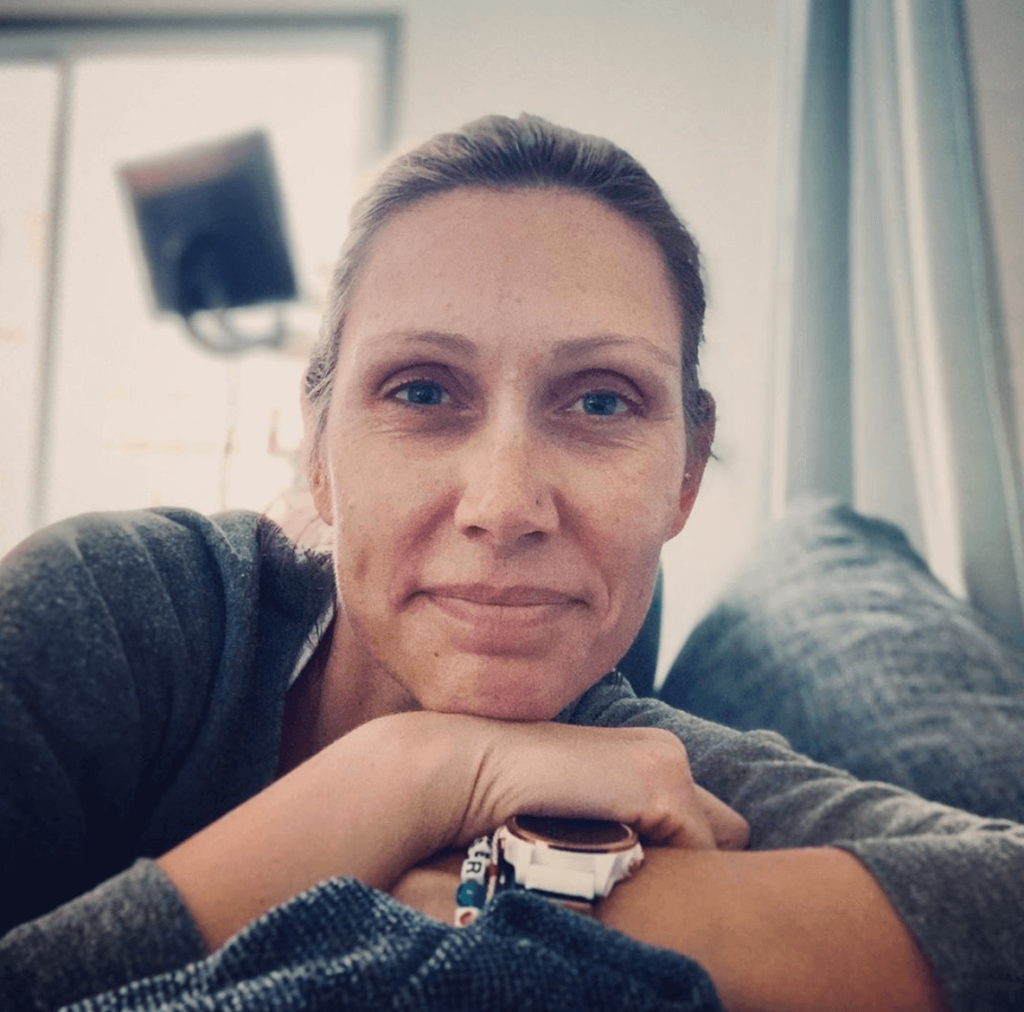
How quickly were you able to get an appointment?
She got me in two business days later, so I asked what to do because normal protocol is not for you to call a cancer center, report you have ovarian cancer, [and] ask to get in.
It’s normally a doctor’s referral and you have to go up this chain. It takes two weeks, and that’s what happened.
I called. They said they had an appointment in two weeks and would call me back. Sometimes the oncologist takes people Monday afternoons.
I remember thinking, “I was just told I had high-grade ovarian cancer. I Googled it; it meant it grew quickly. Two more weeks in my body — what is this going to do?”
I lucked out. She opened up her schedule, probably due to my age because you don’t have a lot of 36-year-olds walking through your door.
She saw me that Monday morning. I went from knowing I had cancer to only having to really wait a weekend, which most people don’t.
Describe the first appointment with the gynecological oncologist
I walked in her office on that Monday afternoon, and we discussed what was going on. The only issue is that more times than not, you cannot diagnose ovarian cancer without actually doing a procedure. It’s normally a debulking procedure, or you’re going to do the biopsy.
They can normally do it on the table and be able to tell. Then they have to go through the rest of the debulking procedure if it comes back you have ovarian cancer.
But in my case, I knew I had ovarian cancer, and I knew the grade level that I have. What I didn’t know, which is the most important part, is what stage I was.
That was what we had to figure out at this point. We had to come up with a game plan to do that.
Advocating for yourself as a patient
My perspective on it changed. Now I’m very much, ‘Hey, what’s going on?’
My lead oncologist knows how I am, so as soon as anything [happens], even when I go through my check-ups now. She gets the alert. She pushes it straight to MyChart.
During all that was going on, I did not want to know all of that, so I didn’t sign up to have all of my records and everything being sent straight to me.
I didn’t sign up for that until 18 months ago, which is kind of backwards. She either releases it right away or text messages me and says, “Here’s what’s going on. Things look really good.”
That’s an important thing, too. If you have a medical team, your lead person should be able to figure out what is the best way for you to receive news and how you prefer to have it delivered.
A lot of people don’t like to do it until they’re in person. Me, I’m like, “Let’s rip the Band-Aid off. I want you to tell me now, and then we can discuss it when I come in. We still have my appointment, but let’s talk through this now since you have the information.”
»MORE: How to be a self-advocate as a patient
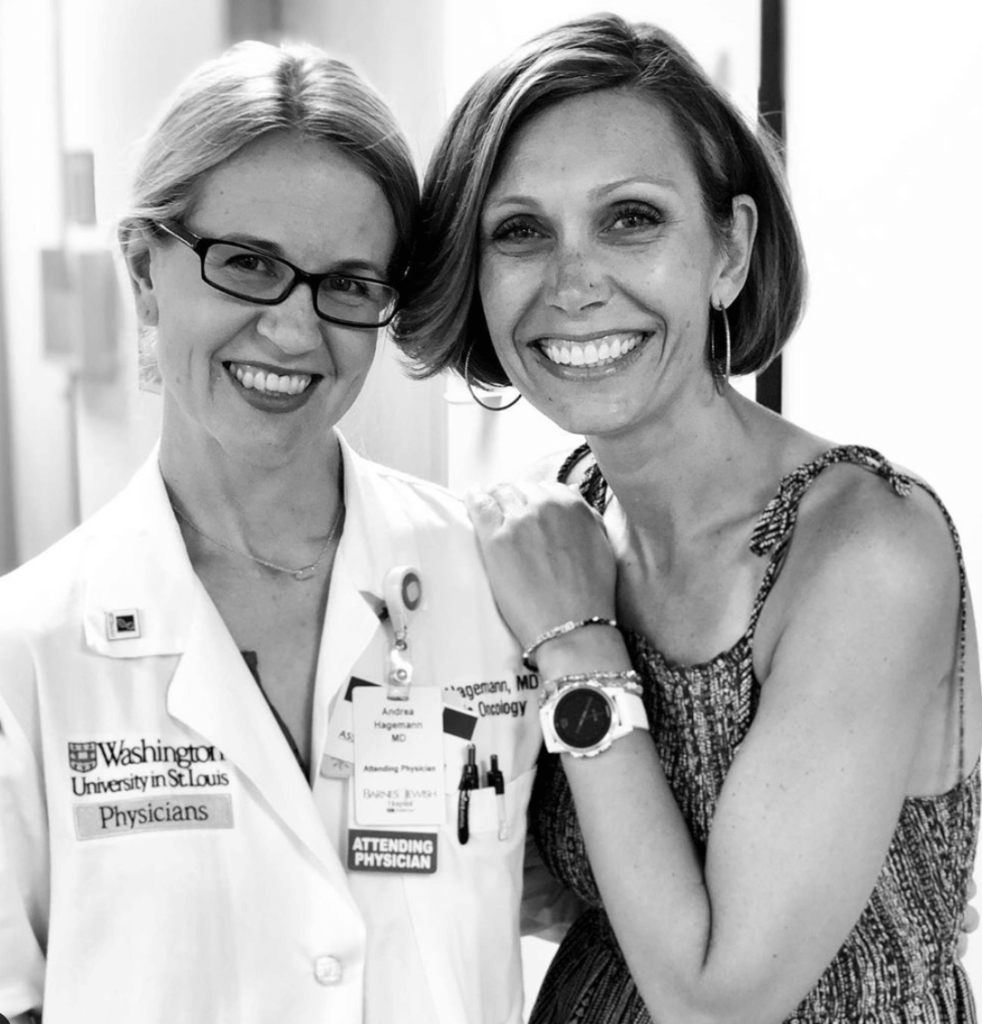
The importance of your doctor’s bedside manners
She does not introduce herself by doctor. She walked in the door and said, “Hi, my name is Andrea. I am so sorry that we’re having to meet under these circumstances,” and gave me a hug.
That speaks volumes for who she is as a person. This is how she treats everybody. She’s never introduced herself as Dr. Hagemann to any of my friends or family. It’s always Andrea, and if you ask any of her other patients, it’s the same.
I think in doing that, she tries to put herself at our same level. She’s not trying to elevate where she is. She wants to be at your level.
She spent two hours with me that day. I went back by myself — it was something I wanted to do by myself — and walked through what this looked like, what next steps would be, what that next surgery was going to look like, and what our hopes were.
Our hopes were that, from what the pathology (biopsy) report had shown, it looked to be like it would be the one ovary. The fallopian tube was clear, as was the other ovary.
From what they could tell from the cyst they removed, there was no cancer on that other side. She walked through all that. She listened. I cried.
How was it having your parents come into the appointment?
She asked if I had parents there, and I said yes, they were in the waiting room. She asked how I wanted to do this next part, and I said I needed her to talk to them. I would sit there, and if she could explain to them what she had just explained to me, that would be great.
She took her time and explained everything. She let them ask questions because they had a lot. It’s a lot for whoever will be your caregiver to take in.
Although I was 36 years old, I was single. The dad role takes over, and he was like, “I have to take care of my daughter [and] be fully involved in what’s going on.”
I could tell he had done his research and was asking the questions, like why not a robotic surgery? There are reasons why you do or don’t do a regular procedure, so we learned about all of that. The game plan was I would go in four days later to get surgery.
It was very quickly moving, and was really great. My relationship with Dr. Hagemann started off really great, and we still have a great relationship now.
How did you decide what kind of surgery to pursue (laparoscopic or robotic)?
[Editor’s Note: Always check with your doctor on medical information]
My goal was no matter what, I needed to stay alive for my children. My tumor had ruptured, which meant potentially there were microscopic “pieces” floating around my abdominal fluid. That means it could have attached to different organs, and that comes into play.
I had a full hysterectomy, including cervix. In a debulking procedure for ovarian cancer, I have a 13-inch incision. They checked my stomach wall to make sure nothing was there. They checked on all the other organs.
They take out your colon and intestines and go through it piece by piece. The stuff they’re looking for is granular, and the only way to find it is by touch.
In using the robotic procedure, you’re not able to do as thorough of a check. My omentum’s gone as well, and they consider that an organ. It’s a filter that catches everything. That’s usually the next place the cancer goes once the tumor ruptures. I was lucky and did not have it there either.
What we would find out, having my uterus removed, was I did have a focused group of endometrial cancer as well. That would have been done whether the hysterectomy was done laparoscopically or robotically.
My oncologist knew that my goal was whatever I had to do to be here the longest, that was what we needed to do. If that meant the measures were a little more extreme than me backing off and taking a lighter approach, then that’s what I was going to do.
Not knowing what stage it was and knowing the tumor had ruptured, we didn’t really have another option than a full, open procedure.
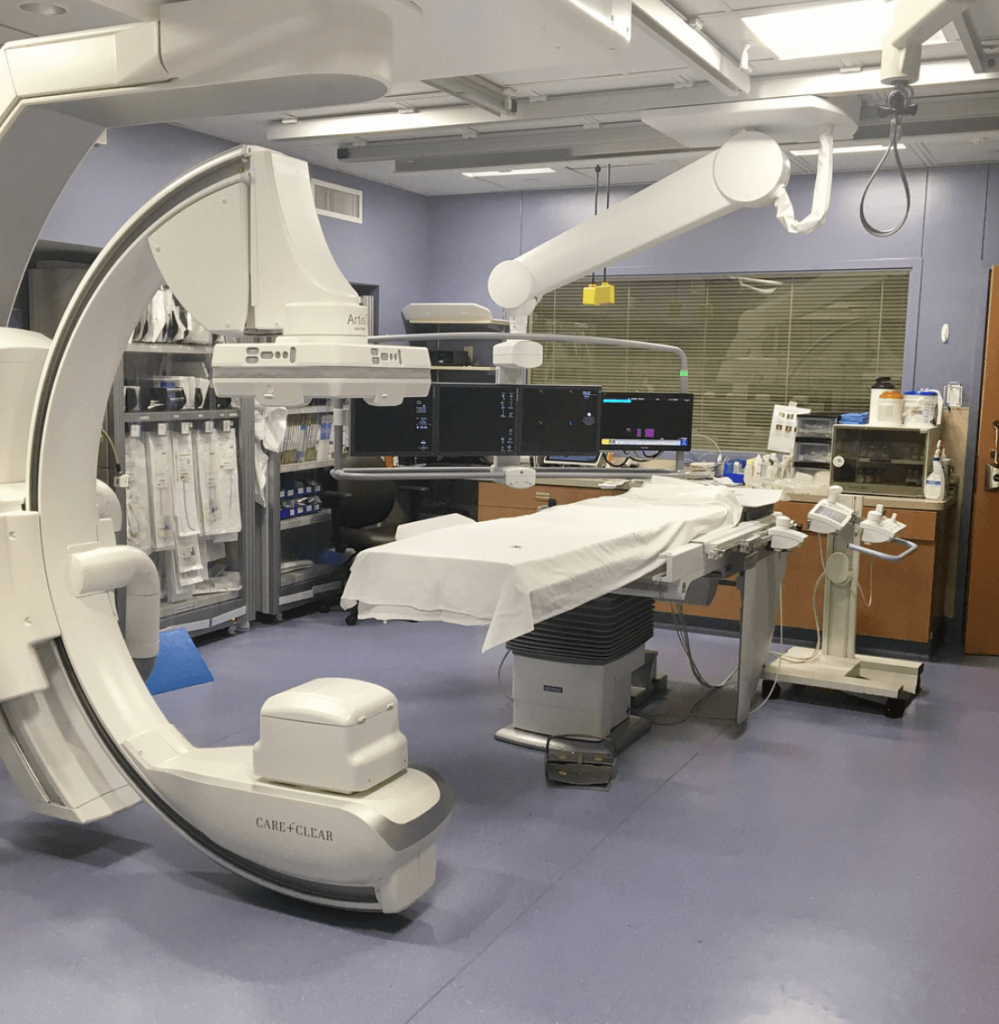
Surgery and Recovery
Was there prep leading to the surgery?
I had scans to make sure nothing else lit up that would be obvious, so they could try to eliminate that. We did that, my blood work, did the fasting after a certain time. They had me drink a bottle of Gatorade to try and hydrate a couple of hours before. I did that with two or three of the procedures I’ve had.
Then I went in for surgery. But [there is] one thing I would recommend. I have extremely low blood pressure. I was going through the pre-op. For the procedure I have, they usually do an epidural, so they have a block, and you can’t feel the significant amount of pain I was in.
The nurse’s assistant asked if there was anything the team should know about. I said, “Yes, please don’t worry. When I come out of surgery, I’m going to be 80 over 50.” She double-checked that I was talking about my blood pressure.
That was an important thing to tell them because an epidural lowers your blood pressure significantly more. In telling them that, I was not able to have the epidural, and they went a different route that they normally do not.
They put catheter pain bulbs in my abdomen in bags. They refilled them while I was at the hospital. You need to continually talk about things like that. A lot of times, people do not. That was key.
We went through everything. I was the first patient up. A pre-op room first thing in the morning is really hustle-bustle right before everything starts!
How were you feeling heading into surgery?
They give you the laughing gas to knock you out, and off we go. I didn’t have any nerves at all. To be honest, I wanted it out. You know you have cancer at that point. I just wanted it out. I didn’t care how you got it out; I wanted it out.
I wanted to know what stage I was because that is extremely important in ovarian cancer. The later the stage, the lower the chances are of being able to go into full no evidence of disease (NED) and the lower the chance I had of fighting this and being here the longest.
I was just like, ‘Let’s do this. I want to get this done.’
How long was the surgery?
It was five to six hours long. It was a pretty big deal. I think I woke up and recovered, saw my parents. I didn’t really remember anything until I got up to the floor that I was on, which was the gynecological oncology floor. I was the youngest person on the floor. It was pretty empty while I was there.
I remember coming around the corner, the nurses stations. I was elevated on the gurney, and the nurses said, “Is that her? There’s no way. She doesn’t look sick, and she’s so young.” I think that’s a lot of people’s reactions, and they probably didn’t think I would hear them or remember, and I did.
I shared a room with an older woman who was going through ovarian cancer. She said to my parents several times that she was sorry, that it wasn’t fair to me, that I shouldn’t be going through this.
The women there are either recovering for surgery or going through chemo. [They] aren’t used to seeing [young patients], and they don’t like it because they know the road you’re going to have ahead of you.
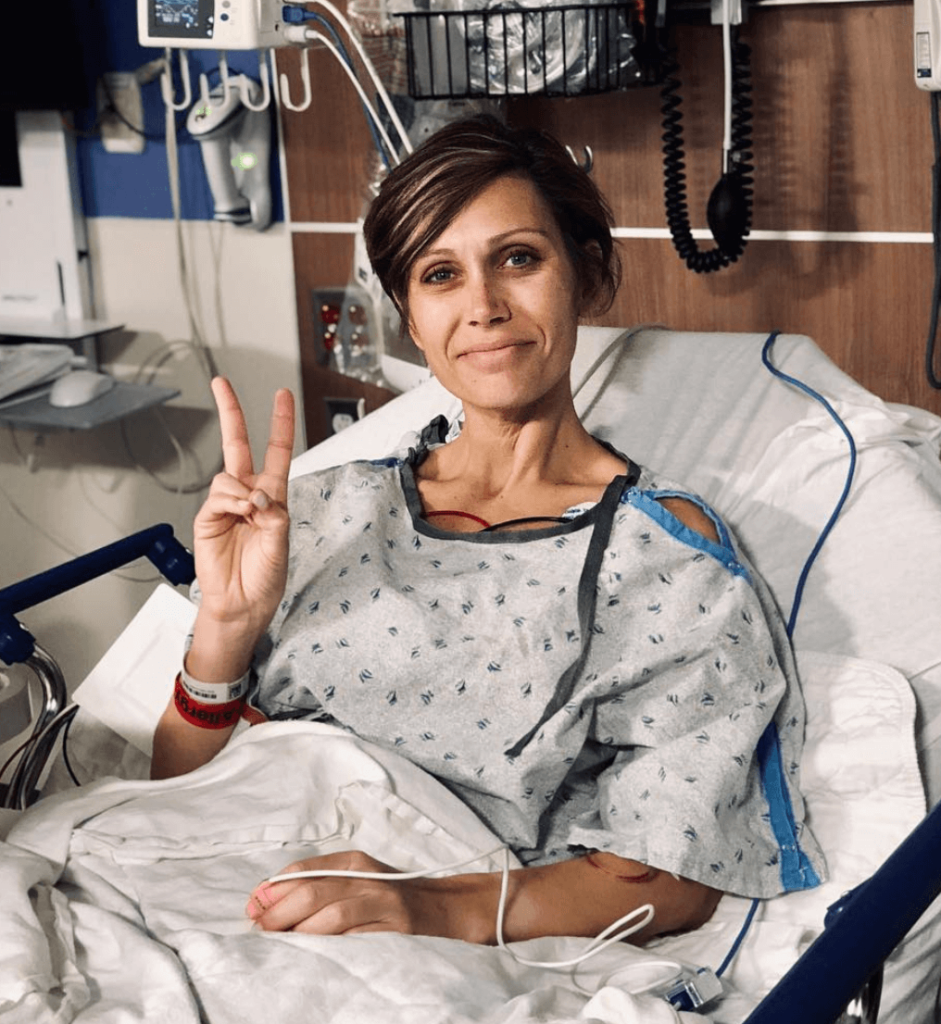
Describe the recovery at the hospital
I didn’t want to walk. That was the hardest part, walking and sitting in a chair with abdominal surgery. It was the worst. They usually want you to have a bowel movement (at the hospital). I had to get my blood pressure up to at least 90, and that took me a little while.
I was able to urinate. They pulled the catheter out within 24 hours of surgery. The only reason they could do it was because I didn’t have the epidural. I had the pain bulbs. Otherwise, I think they leave that block in for a couple or few days, which slows things down a bit.
I was up walking around maybe within 36 hours. You start slowly and eventually get faster. I don’t remember having a bowel movement, and that’s usually the number-one thing they make you do before they discharge you.
I think it’s because everything [inside you] was gone through, taken out, and put back in. It takes longer to heal.
Your body gets moving, and it’s better.
Describe the recovery at home
The recovery from the full debulking procedure was significantly easier pain-wise than the first surgery. It could have just been the post-care I had, the stuff they sent me home with.
I did go on blood thinners for at least two weeks, maybe three. It was very hard to get up and down.
Your best option is a recliner. That’s what I had because I was able to push myself up to the stage where I could put my arms out, not try to help, and have someone pull me up.
How did you learn the stage of your ovarian cancer?
Two weeks later, I would find out my staging. I went back again by myself. The resident came in first. I totally broke down and was lik
